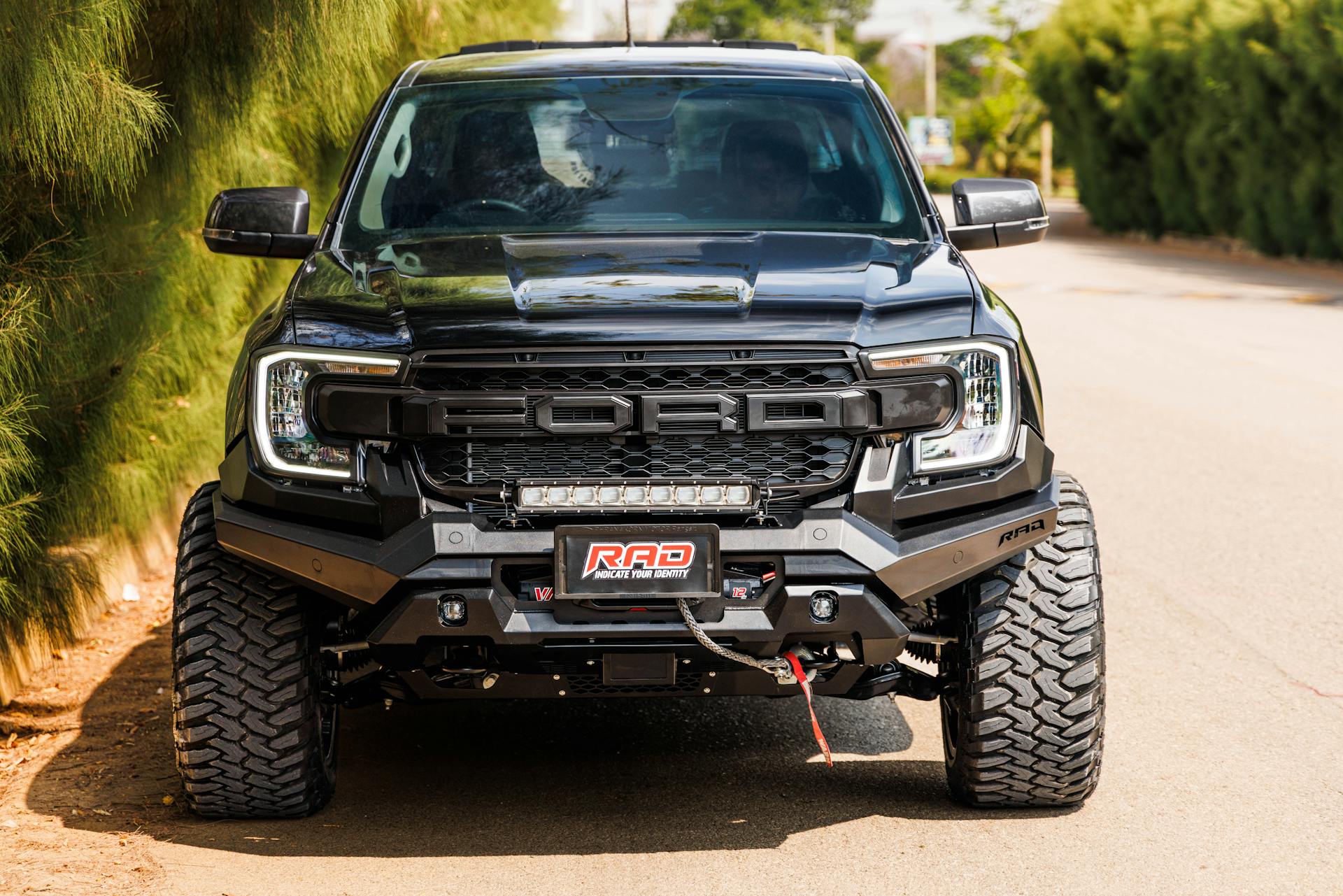
Hybrid semi trucks are changing the game for freight transportation. They can reduce fuel consumption by up to 25%.
These trucks use a combination of electric and diesel power to achieve better fuel efficiency. This is a significant improvement over traditional diesel-only semi trucks.
One of the key benefits of hybrid semi trucks is their reduced greenhouse gas emissions. They can lower emissions by up to 20% compared to traditional diesel trucks.
Companies like Peterbilt and Kenworth are already manufacturing hybrid semi trucks, making them more accessible to the market.
What Is Trucking?
Trucking is a vital part of our economy, transporting goods across long distances.
Freight transportation is a massive industry, with hybrid trucks emerging as a game changer.
Hybrid trucking refers to the use of hybrid electric vehicles in the freight transportation sector.
These trucks combine a traditional internal combustion engine with an electric motor powered by batteries.
In urban areas, the electric motor takes charge and is used at lower speeds, offering great efficiency.
The diesel engine takes over on highways and during heavy-duty functions.
Hybrid trucks recharge their batteries through regenerative braking and redirection of energy from the diesel engine.
This unique feature makes them a promising solution for the freight transport industry.
Their economic fuel use, reduced emissions, and reliable power make them an attractive option for trucking companies.
Hybrid semi trucks are designed to provide a balance between power and efficiency, making them ideal for long-distance hauls.
History and Evolution
Hybrid semi trucks have a rich history that dates back to the early 2000s.
The introduction of hybrid trucking began in the early 2000s, marking a significant shift towards more environmentally friendly and fuel-efficient transportation.
General Motors introduced a hybrid diesel-electric military truck in 2003, equipped with a diesel engine and a fuel cell auxiliary power unit.
This was a major milestone in the development of hybrid technology in heavy-duty vehicles.
By 2004, companies like Mercedes-Benz, Micro-Vett SPA, and the International Truck and Engine Corp. had introduced hybrid light trucks, expanding the reach of hybrid technology.
The mid-2000s saw further advancements with Isuzu introducing the Elf Diesel Hybrid Truck in Japan and Mitsubishi launching the Canter Eco Hybrid in the U.S. market.
These early models paved the way for the development of more sophisticated hybrid trucks, leading to the introduction of the first U.S. production commercial hybrid delivery truck, the International Durastar Hybrid, in 2007.
Benefits and Advantages
Hybrid semi trucks offer numerous benefits and advantages that make them a compelling choice for transportation companies.
One of the most significant advantages is improved fuel efficiency, which can lead to substantial fuel savings, especially for long-haul operations where fuel costs are a significant portion of operating expenses.
By combining a diesel engine with an electric motor, hybrid trucks can achieve better fuel economy, reducing overall fuel consumption.
This means that companies can save money on fuel costs, which can be a substantial expense for long-haul operations.
Hybrid trucks offer the best of both worlds between traditional diesel trucks and fully electric trucks, making them adaptable for various terrains and situations.
They can switch between electric and diesel power, optimizing performance based on driving conditions.
Challenges and Limitations
Battery limitations are a significant challenge for hybrid semi trucks. Current batteries have limitations in terms of capacity and charging times, which can affect the range and efficiency of hybrid trucks.
Charging stations for hybrid and electric semi trucks are still limited, especially in remote areas, posing infrastructure challenges. This lack of infrastructure can hinder the adoption of hybrid semi trucking.
Hybrid semi trucks may not perform as well in extreme weather conditions, such as extremely cold or hot temperatures, which can affect the efficiency of the battery.
Natural Gas Options
Some hybrid models offer natural gas engines further reducing the carbon footprint and providing a greener alternative to purely diesel trucks.
Using natural gas engines can be a more environmentally friendly option, but it's essential to consider the infrastructure and availability of natural gas fueling stations.
Natural gas engines can be more efficient than traditional diesel engines, resulting in lower emissions and operating costs.
However, the limited availability of natural gas fueling stations can make it difficult to rely on this alternative fuel source.
Some trucks are designed to run on a combination of diesel and natural gas, offering a compromise between fuel efficiency and environmental impact.
This dual-fuel capability can be beneficial for fleets that need to balance their environmental footprint with the need for reliable fueling options.
The Disadvantages of Freight Transport
High initial costs can be a significant barrier for smaller trucking companies or those with limited budgets, making it harder for them to invest in hybrid trucks.
The advanced technology and components used in hybrid systems are more expensive to purchase compared to diesel trucks.
Maintenance costs are a concern with hybrid trucks, as the sophisticated systems like the electric motor and battery may require more frequent repairs and potentially longer downtimes.
Potential breakdowns and repairs could involve significant costs, making it essential for trucking companies to factor in these expenses when considering hybrid trucks.
Battery Limitations

Battery limitations can pose significant challenges for hybrid trucking. Current batteries have limitations in terms of capacity and charging times. This can affect the range and efficiency of hybrid trucks.
Battery replacement is a necessary expense, as batteries in hybrid trucks often need replacement after a few years. This adds to the total operating cost.
Alternative Solutions
Battery electric propulsion is now being used in commercial vehicles like Amazon delivery vans and Tesla semi-trucks.
Researchers are also exploring hydrogen fuel cells to power semi-trucks, which could offer even more fuel savings than battery setups.
Some new startups have gained significant investment by promising semi-trucks powered by hydrogen fuel cells.
However, Timothy Lipman sees some advantages in the Edison hybrid approach, which can result in fuel savings.
Edison's practical solution involves building an electric truck using only parts available in local parts stores, making it more accessible to a wider range of people.
Barber, the founder of Edison, argues that this approach speaks to truckers who love the traditional semi look and worry about range issues with fully battery-electric trucks.
The Edison approach allows truckers to keep their existing trucks while still enjoying the benefits of high torque, bigger power, and better mileage.
This is exactly what many truckers are looking for, as evidenced by the enthusiasm for Edison's solution.
Future of Freight Transport
Hybrid semi trucks offer a valuable middle ground between traditional vehicles and fully electric models.
The initial investment for hybrid trucks is higher, which can be a significant consideration for those looking to transition to a more sustainable fleet.
Hybrid trucking is an exciting development in the industry, and it's clear that it will play a fundamental role in the road to a greener future.
Battery life, diesel dependency, and performance in extreme weather conditions are concerns that need to be addressed, but as technology improves, many of these issues may become less significant.
As we navigate the transition to more sustainable transportation, it's essential to understand the potential setbacks of hybrid trucking and ensure that it's the right choice for you or your company.
Frequently Asked Questions
Is there a fully electric semi truck?
Yes, the Freightliner eCascadia is a fully electric semi truck designed for short-haul routes. It's built on a proven, aerodynamic platform for efficient and reliable performance.
Sources
- https://mercer-trans.com/2024/08/16/pros-and-cons-of-hybrid-trucking/
- https://hackaday.com/2025/02/18/it-works-for-locomotives-why-not-series-hybrid-semi-trucks/
- https://www.volvotrucks.com/en-en/news-stories/stories/2017/nov/introducing-heavy-duty-hybrid-long-haul.html
- https://www.thetruthaboutcars.com/cars/edison-motors-introduces-a-diesel-electric-semi-truck-44513362
- https://www.inverse.com/innovation/electric-semi-trucks
Featured Images: pexels.com


